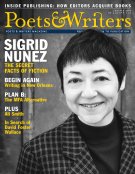Much to the chagrin of writers everywhere, there is no longer anything particularly shocking about a literary contest that fails to yield a winner. When W.S. Merwin announced that he couldn’t find a worthy manuscript to win the Yale Series of Younger Poets in 1997, many writers—including some of the nearly six hundred who entered the contest—could barely contain their outrage. Since then, however, the winnerless contest has become a fairly common occurrence. The Bread Loaf Writers’ Conference of Middlebury College couldn’t find a winner for the Bakeless Literary Publication Prize for fiction in 2001, nor for the prize in creative nonfiction in 2002 and in 2004; nobody won Zoo Press’s Award for Short Fiction competition in 2003 or in 2004; and the Association of Writers & Writing Programs (AWP) didn’t choose a winner for its 2004 Award Series in Short Fiction. Not one of these sponsoring organizations refunded the money they collected from entry fees.
The latest contest to come up short of a winner is the First Book Award in Fiction competition, sponsored by Winnow Press, an independent publisher in Austin, Texas. A message posted on the press’s Web site in October 2005 states that the submissions “were not of the professional quality that we expected to find in a winning entry,” which sounds a lot like what AWP executive director David Fenza said last year about the organization’s short fiction contest: that “no manuscript was worthy of the award.” Before everyone throws their hands up in exasperation, however, there is one small detail worth considering. Winnow Press is refunding entry fees and postage costs, and returning all of the manuscripts that were entered in the contest, along with a complimentary poetry chapbook or fiction book published by the press. Compared to the consolation offered by the aforementioned sponsoring organizations, Winnow Press’s offer seems generous. But, according to the press’s publisher, Corinne Lee, the decision was a no-brainer.
“Why should those entry fees be held by the press if a book is not produced?” she asks. “I believe the issue is simple: Authors send their manuscripts to a contest in the expectation that a winner will be chosen and a book will be produced. If that expectation is violated, the press has an obligation to send entry fees back.” Of course, some sponsoring organizations state up front that entry fees are nonrefundable—even if a winner is not chosen—and in those cases, Lee says, it is up to each entrant to make his own “judgment call” about whether to enter those particular contests.
The First Book Award in Fiction is given annually for a short story collection of no more than 120 pages. The winner receives one thousand dollars, publication of her book by Winnow Press, and twenty-five copies. The entry fee is twenty dollars. The press received approximately three hundred submissions to the 2005 competition.
Lee, along with Winnow Press editors Susan Long Haga, Colleen Hobbs, Brett Holloway-Reeves, Eileen Joyce, Jael Polnac, and Elizabeth Smith, screened the manuscripts and made the decision to end the competition sans winner before passing along any finalists to Roger Boylan, also an editor at Winnow Press, who was to be the final judge. As a result, Boylan was not paid the five hundred dollars that Winnow Press contest judges are normally given for their services. Lee stresses that it was a difficult decision to make, one that was arrived at only after a half-dozen meetings over a period of six months, but that in the end “all of the finalists would have required heavy editing to be publishable,” she says. “That did not seem to warrant…a one thousand dollar prize and publication.”
The entry fees for Winnow Press contests—there are three awards for poetry and two for fiction—are used exclusively for the publication of the winning books, so if there is no winning book to publish, Lee says, it stands to reason that the money is returned to the entrants of that particular contest. Nevertheless, the decision to return the entry fees, the postage, and the manuscripts is costing Winnow Press ten to fourteen dollars per entry “and involves a lot of work hours,” says Lee, who is offsetting some of the costs with her own money.
Despite the unfortunate outcome of the 2005 competition—for the three hundred entrants and for the press—Lee says the experience will not change the way they administer future contests. “We will continue to refund entry fees for contests if a winner is not chosen. However, we have serious doubts that we will continue the First Fiction Award. This last crop of manuscripts was so disappointing [that it] took the wind out of our small-press sails.”








